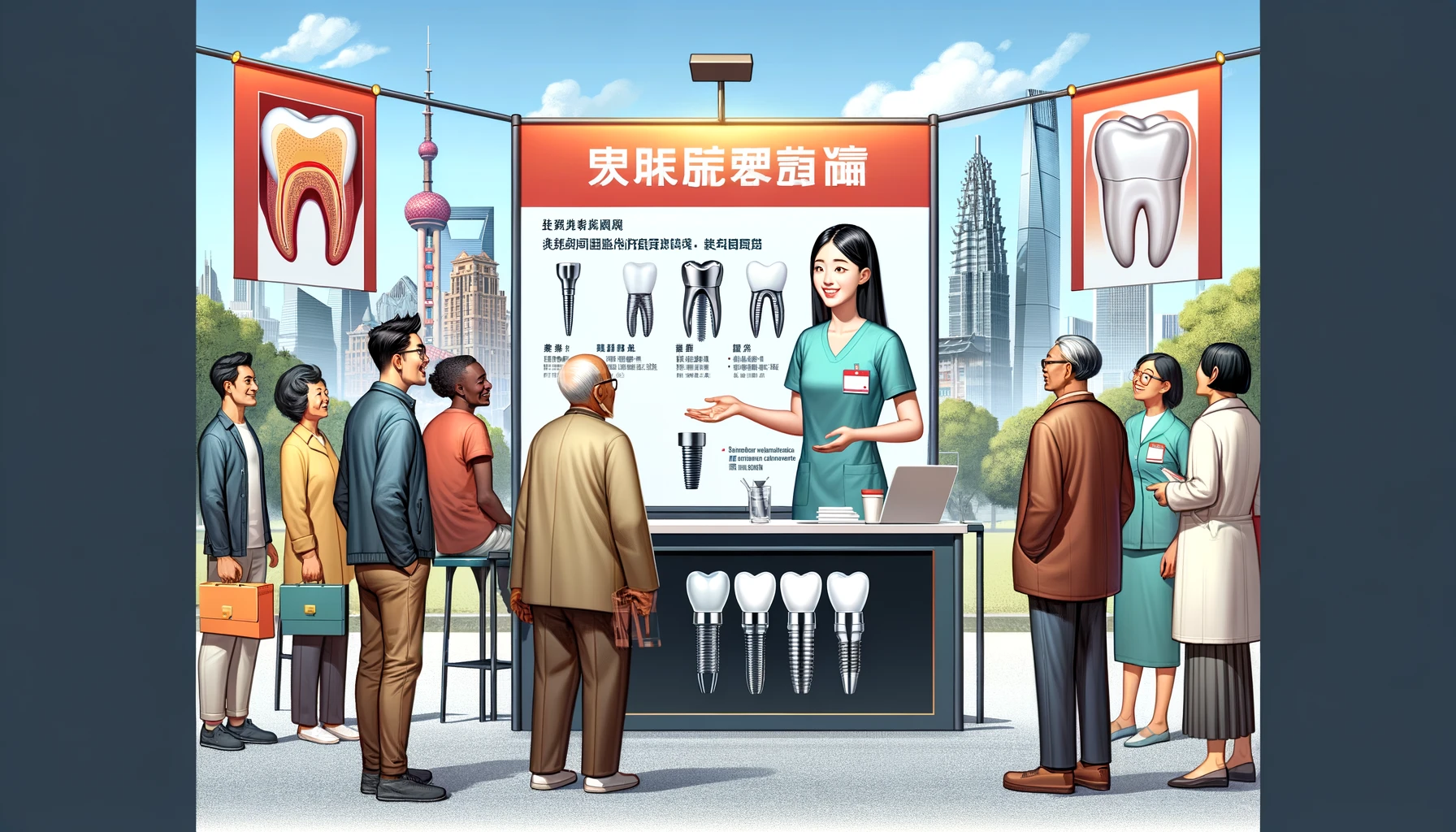Tired of sky-high dental implant costs? You’re not alone. In 2025, China’s dental tourism is booming, offering savings of up to 50% compared to Western prices. But is it worth the trip?
Let’s cut to the chase. This guide will:
- Break down real 2025 costs for China dental implants
- Compare top cities for quality and affordability
- Share insider tips to protect your new smile
As a dental professional who’s seen the industry evolve, I can tell you: China’s implant technology now rivals the best. In fact, a recent study shows 95% patient satisfaction with Chinese dental tourism.
Ready to transform your smile without emptying your wallet? Let’s explore how China’s dental scene in 2025 can make that perfect grin a reality. Your journey to affordable, top-notch dental care starts here.
Dental Implant Pricing in China
China’s dental implant market has seen significant changes, with costs becoming more budget-friendly for patients. As of late 2024, a single dental implant in China ranges from $300 to $1,215, a notable decrease from previous years. This shift is primarily due to government policies and increased market competition.
Key Factors Shaping Implant Costs
The Chinese government has implemented measures to enhance accessibility and affordability of dental implants. The National Healthcare Security Administration (NHSA) set a cap of CNY 4,500 (about $642) on medical service fees for dental implants at public hospitals. A centralized bulk procurement program has led to a 55% average price reduction. Market dynamics also play a role, with Chinese manufacturers investing in advanced technology to improve quality while maintaining competitive pricing. The market now offers a wide array of implant brands and types, catering to various clinical needs and budgets.
Cost Components and Regional Differences
Dental implant expenses in China typically include the implant material and medical service fee. Premium Swiss implants now cost around CNY 1,850 ($253), while popular South Korean products average CNY 770 ($105). Prices vary across cities, with Beijing starting from $990, Shanghai from $1,198, and Guangzhou from $850.
Market Projections and Patient Benefits
The Chinese dental implant market is set for substantial growth, with projections reaching over $1.1 billion by 2030 at a CAGR of 12.3%. As China’s population ages and dental health awareness increases, demand for implants is expected to rise. These trends, combined with lower costs, position China as an attractive option for dental tourism, offering high-quality treatments at competitive prices compared to many Western countries.
City-by-City Breakdown: Where to Find the Best Deals
Dental implants in China offer significant cost savings compared to Western countries, but prices can differ widely among cities. Here’s a concise overview of key locations for dental tourism in China:
Beijing
Starting price: ¥5,000 (approximately $700)
Beijing boasts advanced dental facilities and internationally trained dentists. Public hospitals charge around ¥4,500 due to government price caps, while private clinics may have higher fees.
Shanghai
Starting price: ¥7,020 (approximately $980)
Known for its luxury dental clinics and multilingual staff, Shanghai’s high-end facilities charge between ¥9,500 and ¥11,500 per implant. More budget-friendly options start at ¥7,020.
Guangzhou
Starting price: ¥7,500 (approximately $1,050)
Guangzhou is recognized for its competitive pricing in dental care. Some clinics offer implants starting at ¥7,500, with others charging up to ¥13,501.
Shenzhen
Shenzhen is increasingly popular among Hong Kong residents seeking affordable dental care. While specific prices are not detailed, they are expected to be comparable to Guangzhou’s rates.
These starting prices are indicative; the final cost will depend on your treatment plan and additional procedures. The Chinese government has also capped the medical service fee for implants at public hospitals at ¥4,500 (about $630), enhancing affordability.
When considering dental tourism in China, thorough research is essential. Read reviews and consult multiple clinics to ensure quality care at a fair price. Remember that the expertise of the dentist and the quality of materials are critical factors in your decision-making process.
Navigating Dental Tourism in China: What You Need to Know
China’s dental tourism market offers cost-effective, high-quality implant options for international patients. To ensure a successful experience, consider these key factors:
Quality and Credentials
Research reputable clinics with experienced specialists and international certifications. Top facilities like Tengyang Dental Clinic boast advanced technology and materials, rivaling Western standards. However, be cautious of extremely low prices, which may indicate subpar quality or inadequate anesthesia use.
Cost Considerations
While dental work in China can be significantly cheaper, prices at premier clinics may approach Western rates. The dental implant market is growing rapidly, with the industry expected to reach 49.15 billion yuan by 2023. Consider travel insurance covering dental procedures to protect against unexpected costs.
Language and Communication
Choose clinics with dedicated services for foreign patients to overcome potential language barriers. Clear communication about treatment plans is crucial for a successful outcome.
Treatment Timeline
Dental implant procedures often require multiple visits over several months. Plan your trip accordingly, considering the time needed for initial consultation, surgery, and follow-up appointments.
Legal and Regulatory Aspects
Be aware that seeking recourse for complications after returning home may be challenging. Understand your rights and the clinic’s policies regarding follow-up care and potential issues.
By carefully weighing these factors and conducting thorough research, you can navigate dental tourism in China successfully, potentially saving money while receiving high-quality dental implants.
Essential Oral Health Tips for Dental Implant Patients
Proper maintenance is vital for the longevity of dental implants. Patients should adopt a comprehensive oral hygiene routine to ensure optimal implant health and overall oral wellness. Brushing twice daily with a soft-bristled toothbrush and non-abrasive fluoride toothpaste is essential, taking care to be gentle around the implant site. Daily flossing with unwaxed tape or implant-specific floss, combined with the use of interdental brushes, effectively removes plaque and food particles from hard-to-reach areas.
Regular professional care plays a crucial role in implant maintenance. Scheduling bi-annual dental check-ups allows for thorough cleanings and monitoring of implant condition. Lifestyle factors significantly impact implant health; quitting smoking and limiting alcohol consumption promote better healing and reduce the risk of implant failure. A balanced diet rich in vitamins and minerals supports overall oral health, while avoiding hard or sticky foods protects implants from damage. For those who grind their teeth, wearing a custom-fitted mouthguard can provide essential protection. By implementing these strategies, patients can significantly enhance the long-term success of their dental implants and maintain a healthy, confident smile.
FAQs
Q: Are dental implants in China safe?
A: Yes, when performed by qualified professionals in reputable clinics, dental implants in China are just as safe as those done in Western countries. Many Chinese dentists are internationally trained and use the same high-quality materials and techniques as their Western counterparts.
Q: How long does the dental implant process take?
A: The entire process typically takes 3-6 months. This includes the initial consultation, implant placement surgery, healing period, and final crown placement. However, some clinics offer same-day implants for suitable candidates.
Q: Will my insurance cover dental implants in China?
A: Most international insurance plans do not cover elective procedures abroad. However, some dental tourism-specific insurance policies may provide coverage. It’s best to check with your insurance provider directly.
Q: What is the success rate of dental implants in China?
A: The success rate of dental implants in China is comparable to global standards, with many clinics reporting success rates of 95-98% for properly maintained implants.
Q: Can I get same-day dental implants in China?
A: Yes, many clinics in China offer same-day or immediate load implants for suitable candidates. However, this option may not be appropriate for everyone and should be discussed with your dentist.
Conclusion: Smiling Confidently with Affordable Dental Implants from China
Choosing to get dental implants in China can be a smart financial decision without compromising on quality. With costs significantly lower than in many Western countries, state-of-the-art facilities, and highly trained professionals, China offers an attractive option for those seeking affordable dental care.
Remember to do your research, choose a reputable clinic, and follow proper oral care guidelines to ensure the longevity of your new implants. By combining the cost savings of dental tourism in China with diligent oral health practices, you can achieve the smile you’ve always dreamed of without breaking the bank.
Ready to take the next step towards your perfect smile? Contact our partner clinics in China for a personalized consultation and start your journey to affordable, high-quality dental implants today!
The average cost of dental implants in China varies widely, typically ranging from CNY 4,500 to CNY 30,000. Factors such as the type of implant material, the surgeon’s experience, and the geographic location of the clinic contribute to this variation.
Yes, generally, dental implants tend to be more expensive in urban areas compared to rural areas. This is due to higher operational costs in cities and the availability of more advanced and specialized dental services.
The National Healthcare Security Administration (NHSA) has implemented a price cap at public hospitals, setting the medical service fee for dental implants at a maximum of CNY 4,500. This regulatory measure aims to make dental implants more affordable and accessible, especially in public healthcare settings.
When selecting an implant material, consider factors like biocompatibility, durability, and aesthetics. Ceramic implants are bio-compatible and aesthetically pleasing but can be more expensive. Titanium implants are known for their strength and longevity and are generally less costly.
Traveling for dental implants, known as dental tourism, can be cost-effective but involves considerations like travel expenses, potential language barriers, and follow-up care challenges. It’s essential to weigh these factors and consult with a dental professional before deciding.















